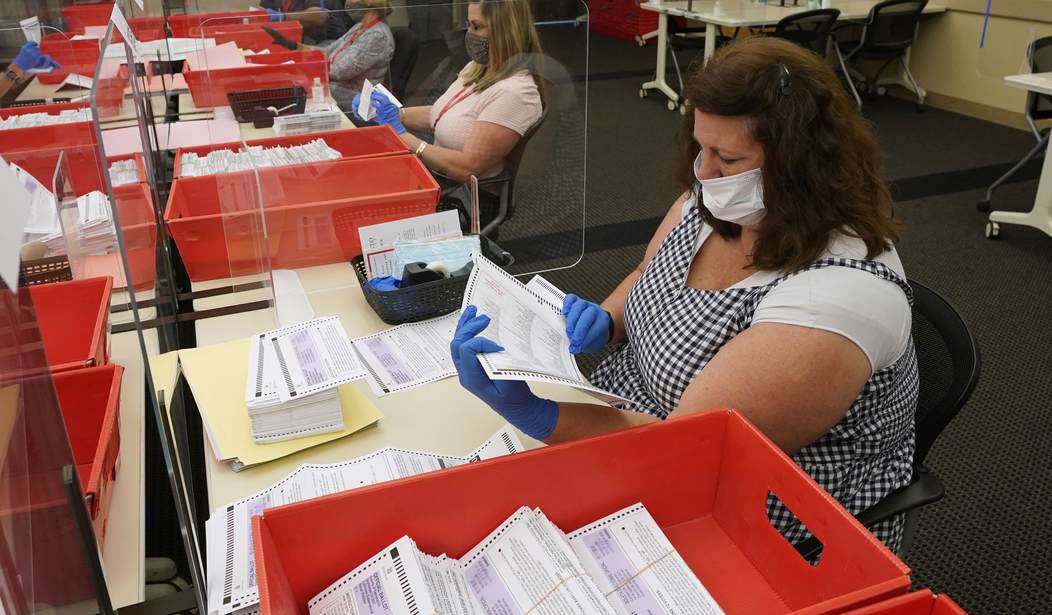With many elections today decided by fewer than 1% of votes, election integrity has become more important than ever. Republican state legislatures should take decisive action to end opportunities for election fraud.
Wyoming leads the way by requiring proof of citizenship to register to vote, as Trump seeks. Previously, Kansas and Arizona enacted similar laws. Still, those have been blocked or tied up in court, and Wyoming should prepare to provide evidence of election fraud in court when its new law is challenged.
On Thursday, Wyoming HB 156 became law to ensure that voters there have presented proof of their American citizenship and residency before casting a ballot. Wyoming’s Republican Gov. Mark Gordon feebly declined to add his signature to this legislation, which became law regardless.
On Thursday in Texas, a liberal federal judge tossed out an election integrity law enacted in 2021 to reduce fraud in connection with mail-in ballots. Voters over 65, which is a large percentage of the voting public, and those with disabilities are allowed to cast their votes by mail in Texas without giving a reason.
The Texas legislature added a requirement that voters include an ID number to ensure that the ballots were legitimately mailed in by the person listed on the ID number. The good law also required anyone assisting the voter to sign an oath under penalty of perjury to ensure its integrity.
In states having Republican trifectas, where Republicans control both chambers of the legislature and the governor’s office, 66 election-related laws have been enacted. Nearly three times that many are working through the legislatures this spring.
Recommended
In addition to Wyoming, other states that are leading on this issue are Arkansas, Utah, Mississippi, and South Dakota. The Arkansas Senate deserves particular credit for recently passing bills to improve the integrity of putting an issue on the ballot for voter approval to become a law.
The Arkansas Secretary of State observed that out-of-state groups having lots of money “are able to get almost any issue on Arkansas ballots.” Nearly half the states continue to be vulnerable to the misuse of their ballot initiative process by out-of-state and even foreign billionaires to enact laws.
On the fundamental issues of abortion, marijuana, and gambling, liberals are enacting their agenda in predominantly conservative states by using hired petition gatherers to obtain signatures to qualify for the ballot. Then liberals outspend conservatives by 10-to-1 or more to pass these measures as new laws with a flood of television and internet advertising.
The conservative states need to reform this process, a relic from the Progressive Era early in the 20th century when corporate interests overly influenced state legislatures. The ballot initiative process was supposed to be a counterweight for the people to push back against corporate spending to enact laws in the legislature.
Today, ballot measures have become the opposite, whereby big money by liberals is buying the laws they want and lining their own pockets by legalizing gambling and other bad behavior. Online sports gambling was legalized in Missouri last November by a margin of less than 3,000 votes, based on $43 million spent in support and only $9 million in opposition.
Arkansas Senate Bill 207 requires petition signature-gathering canvassers to inform potential signatories, verbally or in writing, that petition fraud is a Class A misdemeanor. This would help reduce the fraudulent collection of signatures to place a proposed law on the ballot.
Arkansas SB 208 requires that petition signers show a photo ID, which the canvassers must use to verify a signatory’s identity. Otherwise, signatures may not be gathered and included toward the minimum amount needed to place the measure on the ballot.
Arkansas SB 209 commands that the Secretary of State not recognize and count signatures on a petition for which there is a preponderance of evidence that the canvasser violated any law in collecting signatures. SB 210 requires that signatories read or have the title read to them before signing a petition.
Finally, Arkansas SB 211 requires the canvasser to submit a sworn statement indicating compliance with all the signature-gathering laws. Without the sworn statement, the Secretary of State is ordered not to count the signatures gathered by that canvasser.
The Republican supermajorities in Ohio, Missouri, and elsewhere legislatures should follow this lead taken by the Arkansas Senate. Marijuana was recently legalized by ballot initiatives in Ohio and Missouri over objection by the elected representatives of the people. Still, the legislatures and courts in conservative states could end this misuse of the initiative process.
The Arkansas Supreme Court set the example last fall concerning harmful ballot initiatives. It adequately excluded from the ballot both the marijuana and abortion-on-demand ballot initiatives that Missouri and Ohio allowed.
John and Andy Schlafly are sons of Phyllis Schlafly (1924-2016) and lead the continuing Phyllis Schlafly Eagles organizations with writing and policy work.























Join the conversation as a VIP Member